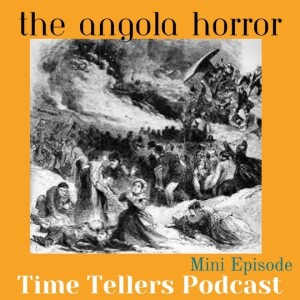
Saturday Aug 31, 2024
Time Tellers Mini #1 "America's Forgotten Train Tragedy: The Angola Horror"
Welcome back to Time Tellers, where we journey through the pages of history to uncover stories that have shaped our world. Today, we're taking you back to a cold winter's day in December 1867, when a small town in New York State became the site of one of the deadliest train disasters in American history. This is the story of the Angola Horror.
It was December 18, 1867, and the village of Angola, New York, was cloaked in the chill of winter. The Buffalo and Erie Railroad's New York Express was making its way from Cleveland, Ohio, towards Buffalo, New York, packed with holiday travelers. Among those who planned to take this journey was the famous John D. Rockefeller, who missed the train due to running late. Little did he know, his tardiness would save his life.
The train, running nearly three hours late, sped through the icy landscape, its wooden cars shaking on uneven tracks. As it approached the rickety bridge over Big Sister Creek, disaster struck. The rear axle of the last car snapped, causing the train to derail and plunge 50 feet into the icy creek below. The wooden cars shattered, and the potbelly stoves used for heating ignited a deadly inferno.
Locals rushed to the scene, but the intense fire and bitter cold made rescue efforts nearly impossible. The Angola Horror claimed 49 lives that night, leaving behind a scene of unimaginable devastation. Newspapers nationwide were filled with grisly illustrations and heart-wrenching accounts, dubbing the disaster the Angola Horror.
The tragedy prompted significant reforms in railroad safety, including replacing wooden cars with steel ones and eliminating on-board stoves. Though these changes came too late for the victims, they would go on to save countless lives in the future. Today, a small monument in Angola stands as a silent tribute to those who lost their lives on that fateful night.
Join us as we reflect on the fragility of life and the often overlooked stories that shaped our history. It's a tale of loss and progress, showing how a nation shaken by tragedy found the will to improve and protect its people. Thank you for joining us on this journey back in time. Until next time, stay curious and keep exploring.
Comments (0)
To leave or reply to comments, please download free Podbean or
No Comments
To leave or reply to comments,
please download free Podbean App.